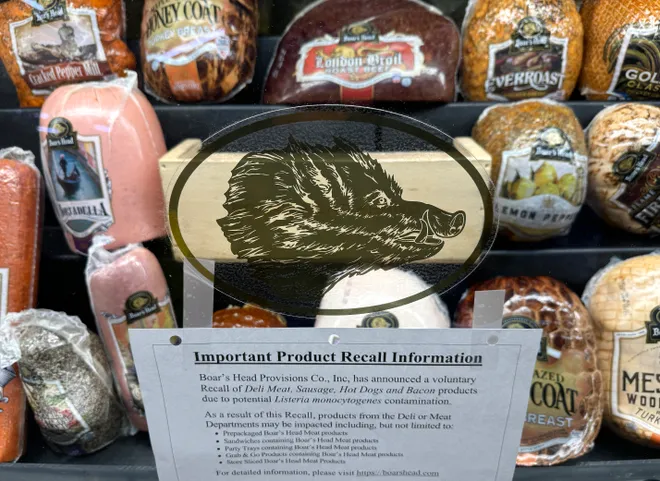New Boar's Head lawsuit details woman's bout with listeria, claims company withheld facts
A new multi-million dollar lawsuit and additional inspection records have shed more light on the ongoing Boar's Head listeria outbreak that has killed at least nine in states across the U.S.
U.S. health agencies including the Centers for Disease Control (CDC) and U.S. Department of Agriculture (USDA) have been working in tandem with Boar's Head and other investigative agencies to determine the origins and scope of the outbreak, which was first reported on July 19 and has resulted in at least 57 hospitalizations and nine deaths across 18 states as of Aug. 28, according to the CDC investigation.
The spread of listeria has been connected to sliced deli meats distributed by Boar's Head, which initially issued a recall for 207,528 pounds of its liverwurst on July 26. The company issued an expanded recall on July 30 to include every product made at the same facility where its liverwurst was produced, equating to about 7.2 million pounds.
Several lawsuits have since been filed against the company, including a wrongful death suit on behalf of the family of a Holocaust survivor who died as a result of eating contaminated liverwurst.
A new suit, filed earlier this month, alleges that adulterated liverwurst made one Virginia woman so sick, she spent weeks in the hospital. The lawsuit also claims that Boar's Head knew of the conditions in its Jarratt, Virginia plant before people began getting sick and accuses the brand of "concealing" information about contaminated products.
Human toll:His dad died from listeria tied to Boar’s Head meat. He needed to share his story.

$11 million lawsuit alleges Boar's Head 'intentionally concealed' issues
A lawsuit filed Sept. 6 by food safety attorney Bill Marler on behalf of Virginia resident Barbara Schmidt alleges she purchased Boar's Head liverwurst from a local Harris Teeters in Williamsburg on July 12. After consuming the deli meat, she began to feel ill the following day, July 13, with "vomiting, fever, fatigue, headache, chills, and confusion."
The lawsuit says Schmidt was consequently sent to the emergency room on July 16, where she stayed for three days. She was released on July 19 but returned the following day due to her deteriorating condition and was admitted with a 104-degree fever.
She was again hospitalized for nine days, spending at least six of those in the ICU undergoing "invasive procedures that were necessary to save her life," says the suit. She was then released to a rehabilitation center, where she had to stay for recovery until she was finally discharged on Aug. 8, more than three weeks after her initial ER visit.
The complaint alleges that, even upon her return home, Schmidt had to continue receiving antibiotic infusions to treat the ongoing listeria infection. Public health officials determined that Schmidt had not only suffered a listeria infection but it was caused by the Boar's Head outbreak, court documents said.
Schmidt, who is still recovering, has "incurred, and will continue to incur, substantial medical bills and expenses associated with the treatment of her injuries," says the suit, which also alleges pain, suffering, emotional anguish, lost wages and lost wage-earning capacity.
USA TODAY has reached out to Boar's Head for comment.
Lawsuit claims Boar's Head 'intentionally concealed and suppressed' details
The complaint alleges that Boar's Head participated in multiple counts of negligence, breach of warranty, fraudulent concealment and breach of the Virginia Consumer Protection Act. Specifically, it alleges that Boar's Head "intentionally concealed and suppressed material facts concerning the adulteration of the food products it manufactured, distributed, supplied, and sold to their customers."
Pointing to inspection reports and records of conditions in the factory, the lawsuit alleges that Boar's Head "knew its food was adulterated and nonetheless failed to timely disclose this information."
The suit seeks $1 million in compensatory damages as well as $10 million in punitive damages.
Boar's Head reports:Boar's Head plant linked to listeria outbreak had bugs, mold and mildew, inspectors say

Inspection reports dating back to 2022 shed more light on conditions
As previously reported by USA TODAY, the Department of Agriculture (USDA) found insects, mold and mildew at a Boar's Head plant in Jarratt, Virginia, believed to be the source of the outbreak.
A total of 69 reports of "noncompliances" were filed by inspectors with the USDA's Food Safety and Inspection Service over the past year at the plant in Jarratt, Virginia. Inspectors found insects, black and green mold, mildew, standing and leaking water and other unsanitary conditions in the weeks leading up to Boar's Head's initial recall of more than 200,000 pounds of liverwurst on July 26.
Additional USDA inspection reports dating back even further have since been released, revealing that conditions at the Jarratt plant were reportedly subpar dating back at least to 2022.
The expanded set of documents, which cover Jan. 2022 through Aug. 1, 2024, listed many complaints of noncompliance similar to those in later reports. Inspectors observed leaks and condensation across the plant, including one incident of a dusty plastic sheet full of water hanging from the ceiling over container boxes.
"Sludge," "black smudges," "slimy" materials and other residues were found on machines and in several rooms across the facility. In one instance in which "sludge" was found in equipment, the inspector was told that management advised employees "not to spray the inside of that area," but also failed to advise staff on how to physically clean it.
Dripping water and condensation was found above meat racks and products, along with "putrid," "off" odors, "thick and flaking rust" in several locations including above production lines, and dirt, screws and trash were seen strewn on the floor of production areas.
In one 2022 report, an inspector noted "several ants upwards of 25" crawling in debris on the floor in one area, along with "2 crickets (1 dead), 1 beetle, 1 cock roach-like insect, 1 spider, 1 moth, as well as more ants."
In late October of 2022, it was noted that "deficiencies associated with the establishment's physical conditions were observed that could pose imminent threat to product."
Boar's Head spokesperson Elizabeth Ward previously told USA TODAY that food safety is Boar's Head's "absolute priority."
"As a USDA-inspected food producer, the agency has inspectors in our Jarratt, Virginia plant every day and if at any time inspectors identify something that needs to be addressed, our team does so immediately, as was the case with each and every issue raised by USDA in this report," she said.
Contributing: Mike Snider, USA TODAY
Disclaimer: The copyright of this article belongs to the original author. Reposting this article is solely for the purpose of information dissemination and does not constitute any investment advice. If there is any infringement, please contact us immediately. We will make corrections or deletions as necessary. Thank you.







